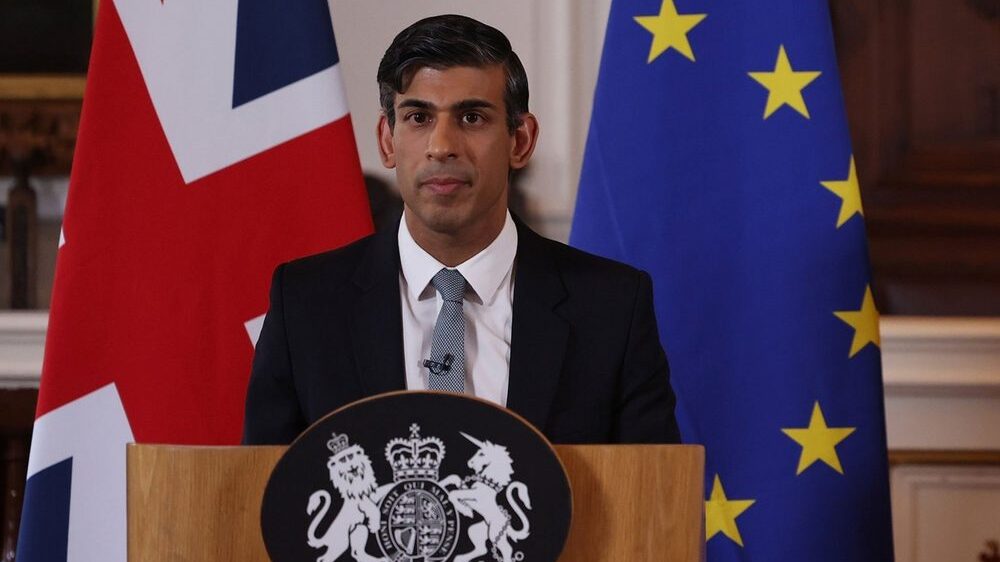
Rishi Sunak.
Photo: Salma Bashir Motiwala / Shutterstock.com
Campaigning to become leader of the Tory party, Rishi Sunak last year signed off on a video in which large stacks of paper marked “EU Legislation,” “EU Red Tape” and “EU Bureaucracy” were passed through an industrial-grade shredder, all to the backing of Beethoven’s Ode To Joy. Nine months later, and with the keys to 10 Downing Street in his grasp, the now prime minister has opted to scrap not all EU laws but, instead, his pledge to have all these removed or reformed “within my first 100 days in the job.”
Business Secretary and one-time leadership hopeful Kemi Badenoch has pinned the blame on “Whitehall departments,” which she accused of spending too much time “focussed” on retained EU laws that should be preserved rather than on those that should be written off. Former Brexit Party MEP Ben Habib told The European Conservative that “her excuse is simply implausible. And, even if it were true, it would be an incredible admission of ineffectual management on her part.”
It doesn’t help that there are almost double the amount of laws (4,800) in need of review than Mr. Sunak originally suggested. Writing in the Financial Times, Stephen Bush suggested that “the policy rationale for abandoning the government’s plan … is obvious. Some of it is good, some of it is bad, because that is the nature of human affairs, but crucially there’s an awful lot of it.” But this begs the question, why make the promise in the first place? (The answer, it seems, is to win an election; the same reason David Cameron promised to cut migration to the tens of thousands, despite knowing this would never be achieved.)
The scrapping of the pledge does not mean, however, that the spin has stopped. Rather, it appears to have gone into overdrive. The “real prize,” Mrs. Badenoch tells Britons, is not shredding all legislation, as we saw in Mr. Sunak’s campaign advertisement, but keeping it in our own books, and adding to laws that “help spur economic growth.” It is worth noting that Tory politicians more often than not cite money when discussing the advantages of Brexit, despite the general recognition that the vote to leave the EU had little to do with the economy (‘Remain’ arguments about which failed to grab hold of large portions of the British public) and much more to do with sovereignty (regardless of people’s understanding of the term)—hence the success of ‘Take Back Control.’ The secretary of state, whose government established a deadline for scrapping hangover legislation, added that “getting rid of EU law in the UK should be about more than a race to a deadline.” She also appeared to shift the legislative goalpost, gloating that “by the end of 2023 we will end the supremacy of EU law,” while maintaining that promises which have not been kept, have been kept.
Mr. Sunak, in this sense, is following in the footsteps of Boris Johnson, whose administration dropped a plan to scrap two retained EU regulations every time a new one was written because it was not “consistent with … achieving [carbon] net zero.” The difference is that, while Mr. Johnson was long accused of simply pretending to support Brexit in order to achieve office, Mr. Sunak’s Brexit credentials tend to go unchallenged. Alex Phillips, another former Brexit Party MEP, this week brought these into question, nothing that “I don’t remember seeing Rishi Sunak holding many correx boards and taking selfies on the campaign trail.”
WATCH: Sparks fly as Alastair Campbell and Alex Phillips clash on the future of Brexit#Newsnight | https://t.co/P0zxS1DNGF pic.twitter.com/jD76cVIGco
— BBC Newsnight (@BBCNewsnight) May 11, 2023
Mr. Habib also told this publication that the EU law U-turn is just another example of “typical Tory turgidity.” He said:
It beggars belief that seven years on from the Brexit vote not a single EU law has been jettisoned from our statute books … The truth is, the PM is a Remainer. He wants the UK to be aligned with the EU. That is also why he (mis)sold the Windsor Framework as a solution to the Northern Ireland Protocol. It is no such thing—it is another form of the Protocol and in some ways even worse.
Brexit was a golden opportunity for the country to chart a bright new independent path. The Tories have squandered it. We are governed by charlatans who do not hesitate to make promises to gain office and are equally unhesitant to break them once elected.
It is most likely that the issue will before long be swept under the carpet. A number of Tories say they are upset at this moment, just as they were about the Northern Ireland Protocol, about which there is now a rather noticeable silence.
